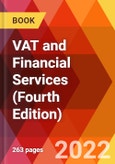VAT and Financial Services takes the reader through the relevant legislation case law, and legal concepts; examines the consequences of outsourcing; looks at the key issues facing financial services and insurance; and discusses the VAT cost sharing exemption. Since the last edition, significant changes include the consequences of Brexit, the abolition of Cost Sharing Groups and significant developments in case law.
VAT and Financial Services takes the reader through the relevant legislation and case law, the legal concepts such as time and place of supply, the distinction between goods and services, what is taxable, and the interaction of these elements; examines the consequences of outsourcing (through a detailed study of 10 significant cases); looks at the key issues facing financial services and insurance; and then discusses the VAT cost sharing exemption.
Since the third edition, there have been significant developments, including (most obviously) Brexit.
The key VAT change is that EU legislation is no longer primary legislation (although many EU VAT principles, obligations and rights have been ‘retained’) and ECJ court decisions are, in general, no longer binding although ‘a court or tribunal may have regard to anything done on or after exit day by the European Court, another EU entity or the EU so far as it is relevant to any matter before the court or tribunal’ (European Union (Withdrawal) Act, 2018 s6(2)). Also, the Court of Appeal decision in HMRC v Perfect [2022] EWCA Civ 330, which is an excise duty case but more widely applicable, confirmed that decisions from any referrals to the ECJ made before 31 December 2020 remain binding on the UK even if the decision is issued after that date.
In addition to this general change, there have been some more specific changes, for example the changes to the VAT (Specified Supplies) Order 1999, which now treats supplies to persons in the EU in the same way as supplies to persons outside the EU and some changes to the status of EU pension funds.
A further change has been to the status of Cost Sharing Groups, an arrangement that allows persons who carry on certain activities to form a group to share costs without creating sticking VAT. As Cost Sharing groups are no longer available to the financial services and insurance sectors, the chapter and appendix covering these have been removed from this edition.
Appendices include: contracts of insurance; Lloyd’s VAT arrangements; HMRC ABI partial exemption guidance for the insurance sector; TOGC legal extracts; and the VAT territory of the EU.
Finance directors and finance controllers in the financial services and insurance sectors and at those who advise these sectors should all find the book helpful.
Table of Contents
About the authorAcknowledgementsContentsTables of Authorities








